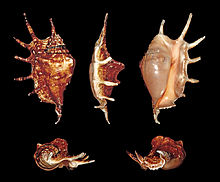Lambis lambis, common name the spider conch, is a species of large sea snail, a marine gastropod mollusk in the family Strombidae, the true conchs.[2]
| Lambis lambis | |
|---|---|

| |
| Shell of a male Lambis lambis | |

| |
| Female Lambis lambis | |
| Scientific classification | |
| Kingdom: | |
| Phylum: | |
| Class: | |
| (unranked): | |
| Superfamily: | |
| Family: | |
| Genus: | |
| Species: | L. lambis
|
| Binomial name | |
| Lambis lambis | |
| Synonyms[2] | |
| |
Distribution edit
This species is widespread in the Indo-West Pacific.[1][2]
Shell description edit
The maximum shell length for this species is up to 29 cm, and average length stands for 18 cm.[1] Lambis lambis has a very large, robust and heavy shell. One of its most striking characteristics is its flared outer lip, ornamented by six hollow marginal digitations. These digitations present subtle differences in shape between genders in this species, as the three anteriormost digitations are short and posteriorly bent in male individuals, and longer and dorsally recurved in females.[1] The color of the shell is highly variable, being white or cream externally and often presenting brown, purplish or bluish black patches. The interior is glazed and may be pink, orange or purple.[1][2]
Ecology edit
Habitat edit
This sea snail lives in mangrove areas, as well as reef flats and coral-rubble bottoms in shallow water from low tide levels to depths of 5m. It is usually found in association with red algae.[1]
Feeding habits edit
Lambis lambis is known to be herbivorous, feeding on fine red algae.[1]
Gallery edit
-
Spider conch, Lambis lambis, anterior end to the right
-
Lambis lambis on a 1969 Indonesia postage stamp
References edit
- ^ a b c d e f g Poutiers, J. M. (1998). "Gastropods". In Carpenter, K. E.; Niem, V. H. (eds.). The living marine resources of the Western Central Pacific Volume 1. Seaweeds, corals, bivalves and gastropods (PDF). FAO Species Identification Guide for Fishery Purposes. Rome: FAO. p. 467. ISBN 92-5-104051-6.[permanent dead link]
- ^ a b c d "Lambis lambis (Linnaeus, 1758)". World Register of Marine Species. 2023. Retrieved 24 June 2023.
External links edit
- "Lambis (Lambis) lambis lambis". Gastropods.com. Retrieved 23 April 2011.
- Sealifebase.org
- Photos of Lambis lambis on Sealife Collection